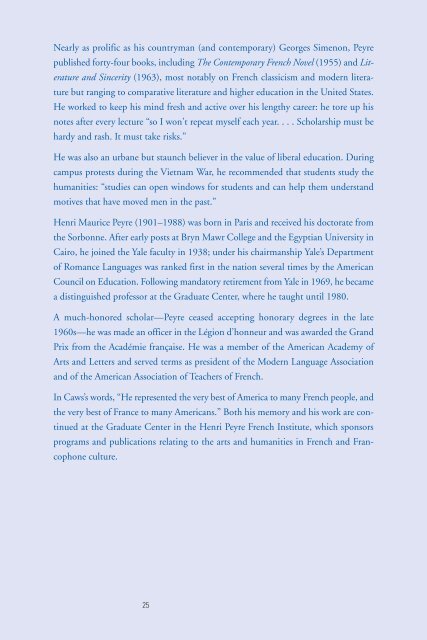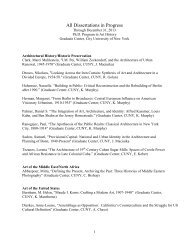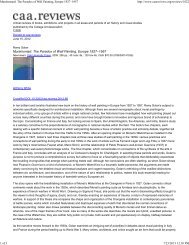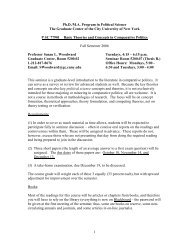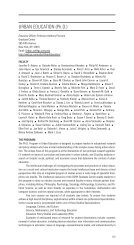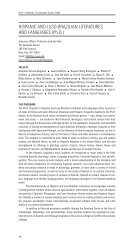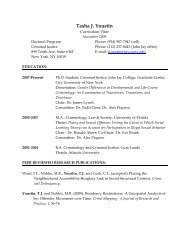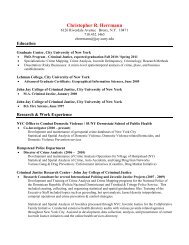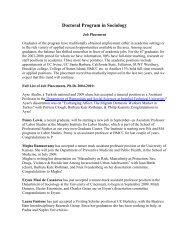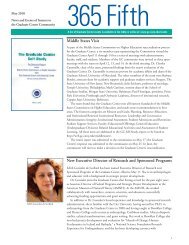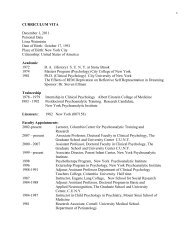Fifty Years at the Center Book - CUNY Graduate Center
Fifty Years at the Center Book - CUNY Graduate Center
Fifty Years at the Center Book - CUNY Graduate Center
You also want an ePaper? Increase the reach of your titles
YUMPU automatically turns print PDFs into web optimized ePapers that Google loves.
Nearly as prolific as his countryman (and contemporary) Georges Simenon, Peyre<br />
published forty-four books, including The Contemporary French Novel (1955) and Liter<strong>at</strong>ure<br />
and Sincerity (1963), most notably on French classicism and modern liter<strong>at</strong>ure<br />
but ranging to compar<strong>at</strong>ive liter<strong>at</strong>ure and higher educ<strong>at</strong>ion in <strong>the</strong> United St<strong>at</strong>es.<br />
He worked to keep his mind fresh and active over his lengthy career: he tore up his<br />
notes after every lecture “so I won't repe<strong>at</strong> myself each year. . . . Scholarship must be<br />
hardy and rash. It must take risks.”<br />
He was also an urbane but staunch believer in <strong>the</strong> value of liberal educ<strong>at</strong>ion. During<br />
campus protests during <strong>the</strong> Vietnam War, he recommended th<strong>at</strong> students study <strong>the</strong><br />
humanities: “studies can open windows for students and can help <strong>the</strong>m understand<br />
motives th<strong>at</strong> have moved men in <strong>the</strong> past.”<br />
Henri Maurice Peyre (1901–1988) was born in Paris and received his doctor<strong>at</strong>e from<br />
<strong>the</strong> Sorbonne. After early posts <strong>at</strong> Bryn Mawr College and <strong>the</strong> Egyptian University in<br />
Cairo, he joined <strong>the</strong> Yale faculty in 1938; under his chairmanship Yale’s Department<br />
of Romance Languages was ranked first in <strong>the</strong> n<strong>at</strong>ion several times by <strong>the</strong> American<br />
Council on Educ<strong>at</strong>ion. Following mand<strong>at</strong>ory retirement from Yale in 1969, he became<br />
a distinguished professor <strong>at</strong> <strong>the</strong> Gradu<strong>at</strong>e <strong>Center</strong>, where he taught until 1980.<br />
A much-honored scholar—Peyre ceased accepting honorary degrees in <strong>the</strong> l<strong>at</strong>e<br />
1960s—he was made an officer in <strong>the</strong> Légion d’honneur and was awarded <strong>the</strong> Grand<br />
Prix from <strong>the</strong> Académie française. He was a member of <strong>the</strong> American Academy of<br />
Arts and Letters and served terms as president of <strong>the</strong> Modern Language Associ<strong>at</strong>ion<br />
and of <strong>the</strong> American Associ<strong>at</strong>ion of Teachers of French.<br />
In Caws’s words, “He represented <strong>the</strong> very best of America to many French people, and<br />
<strong>the</strong> very best of France to many Americans.” Both his memory and his work are continued<br />
<strong>at</strong> <strong>the</strong> Gradu<strong>at</strong>e <strong>Center</strong> in <strong>the</strong> Henri Peyre French Institute, which sponsors<br />
programs and public<strong>at</strong>ions rel<strong>at</strong>ing to <strong>the</strong> arts and humanities in French and Francophone<br />
culture.<br />
25


